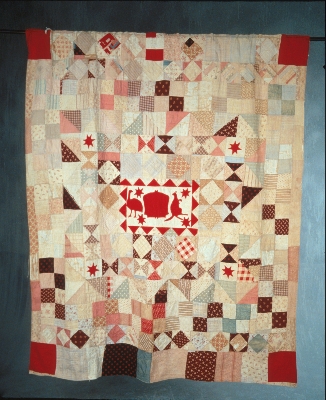Quilt No.773PHM - Powerhouse Museum

2265 x 1975mm
The quilt was made by Amelia Brown (1817-1905) probably on a property called 'Oakvale' near Binnalong NSW about 1890. It remained in the Brown family until the late 1800s when it was given to a friend Margaret Swann (1871-1963). "The quilt stayed in the Swann family home, Elizabeth Farm, Parramatta until the house was sold in 1968. It then went with the two remaining sisters - Edith and Ruth - to their new home in Dural. When following their deaths the estate was divided up, the quilt was given to their niece Margaret Swann. She sold the quilt in about 1978 to Leigh Taumoefolau who in turn sold it to Hoopers in Melbourne. The Museum acquired it from Hoopers." [PHM]
Amelia Brown was "Born in Devon, England, the daughter of James and Mary Parsons, she had married John Brown in 1836 and at the height of the goldrushes came with him and their seven children to Sydney in 1857. One more child, a daughter, was born after their arrival in Australia. The Browns settled on a property called Oakvale, near Binnalong.
A quilt still belonging to descendants of the Brown family - and almost identical in pattern and materials - is said to have been made on the voyage out to Australia. If this was the case, then this quilt may also have been made on the voyage out or shortly thereafter. The form of the coat of arms - with the kangaroo and emu looking backwards over their shoulders - was a popular 'unofficial' coat of arms at the time of the goldrushes and appeared in popular magazines, illustrations and books." [PHM]
Margaret Swann "was the daughter of William and Elizabeth Swann who had lived at Bowning for three years when William Swann was appointed headmaster of the local school in 1877. The Brown children were much older than the Swann children and it is not clear how the two families met. One possibility would be that some of the Brown girls may have helped out in the Swann household. What is known is that they formed a firm friendship and when the Swann family moved to Sydney the Brown girls would come to stay. It is presumably on one of these visits that the quilt was presented to Margaret Swann." [PHM]
"Taken together with the other quilt known to have been made by Amelia Brown, this quilt can be seen as a hopeful tribute made by Amelia Brown as she was embarking on life in her new country. The simple naivety of the central motif has made it an evocative image of Australian women's needlework and one that has been used in numerous publications." [PHM]
Related Quilts:
520 x 520mm
2280 x 1520mm
1980 x 1740mm
2135 x 1727mm






